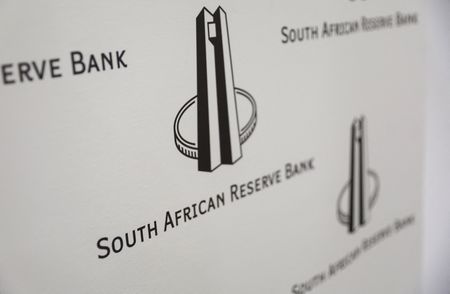By Kopano Gumbi, Sfundo Parakozov and Anathi Madubela
PRETORIA (Reuters) -South Africa’s central bank cut its main lending rate by 25 basis points to 6.75% on Thursday at the first meeting since its inflation target was lowered, easing concerns that the new target would prevent it from cutting rates.
The decision by members of the bank’s Monetary Policy Committee was unanimous.
“Members agreed there was scope now to make the policy stance less restrictive, in the context of an improved inflation outlook,” Governor Lesetja Kganyago told a news conference.
The bank made small downward revisions to its inflation forecasts for 2025 and 2026.
Economists polled by Reuters had been divided on what Thursday’s policy decision would be.
Some thought the committee would take a cautious stance given its new 3% inflation target, while others thought there was room for a rate cut with inflation only slightly above target and within a 1-percentage-point “tolerance band” set by the finance minister.
There has been a long list of positive developments since the last monetary policy meeting in September.
South Africa was removed from a “grey list” of countries subject to increased monitoring for illicit money flows, its sovereign credit rating was upgraded by S&P Global and its mid-year budget review was well-received by investors.
Government borrowing costs have fallen and the rand hit its best level since 2023 against the dollar.
“We remain on track to deliver 3% inflation over the medium term,” Kganyago said. “The tolerance band … does not mean we will be indifferent to inflation anywhere between 2% and 4%. We want to be at 3%.”
The governor, who had for years advocated for a lower inflation target before last week’s formal change, added that the central bank only expected to breach the tolerance band when there are severe shocks.
Given that monetary policy actions have their main effects after 12 to 24 months, people should expect the central bank to hit its target over that time frame, Kganyago added.
(Reporting by Kopano Gumbi, Sfundo Parakozov and Anathi Madubela; Editing by Alexander Winning)











